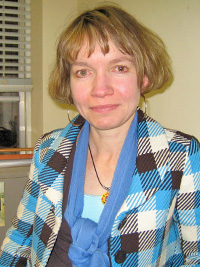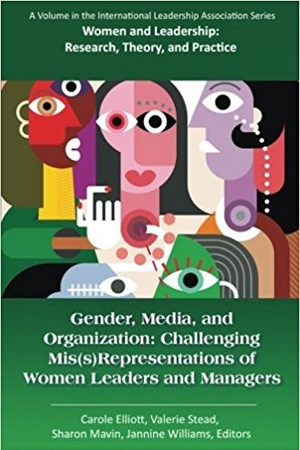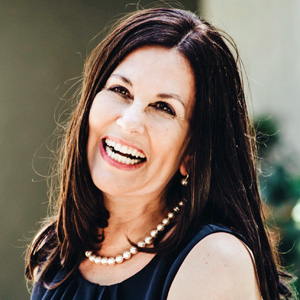Carole Elliott is a professor of human resource development at Roehampton Business School, University of Roehampton. Prior to this she was a senior lecturer in management at Durham University Business School and at Hull University Business School. Her first academic post was at Lancaster University Management School where she was awarded her PhD. She has recently taken part in a new piece of research into how women in leadership and professional roles are represented by the media, funded by the ESRC [Economic and Social Research Council].

“…it’s great we see women professionals represented in the media, but why do we collude with a representation of working life that doesn’t really reflect how we look in our daily working lives?..”
From administrator to academic
The majority of my career has been spent in higher education, first as an administrator then as an academic. I studied for my undergraduate degree in Modern Languages at the University of Western Australia, and after I was awarded my Bachelor’s degree I worked and travelled in France and Germany for around four years.

My Ph.D. focussed on managers’ learning experiences during an Executive MBA programme. The choice of topic led to a longer-term interest in the different ways individuals learn in formal and informal settings. By that I mean we don’t just learn in a classroom environment. A lot of our learning happens informally, and a lot of the time we don’t realise we are learning. I would say not all of our learning is necessarily positive for us as individuals.
Breaking down barriers faced by individuals because they do not conform to taken-for-granted stereotypes
Traditionally for example, women have been socially conditioned to accept that they cannot aspire to achieve senior roles in organisations. As a professor of human resource development, I am continually seeking to examine how organisations try to develop their staff to reach their potential, and to study why there are many barriers faced by individuals because they do not conform to taken-for-granted stereotypes of what, for example, a manager looks like, or what an engineer looks like.
My work
Each day looks different. There is no set pattern to what I do on a daily basis. Currently, I edit an academic journal called Human Resource Development International, so I often start the day by looking at articles people have submitted to the journal.
If I am teaching, I will go over the materials I have prepared for a lecture or a seminar and inevitably make last minute tweaks. I will look at the news headlines and see if there is anything in the news that I think connects to what I will be covering in a lecture of a seminar. I think it’s important to raise students’ awareness of the relevance of what we teach them to the broader context and to their everyday lives.
Research into female stereotypes in leadership
I continue to work on female stereotypes in leadership. One article I have published with Dr. Valerie Stead from Lancaster University Management School, examines how women leaders were represented in the business pages of three UK newspapers during the financial crisis. We found that while media coverage of women leaders during the financial crisis has promoted a greater acceptability of ‘feminine qualities’, it is not enough to challenge the association of masculinity with leadership.

To give you a flavour of the topics covered in the book, one chapter examines how women corporate leaders have been represented in Time magazine. Another chapter discusses the prejudicial treatment faced by Canadian women politicians in media coverage.
Role played by the media in reinforcing stereotypes
The media has the power to shape individuals’ realities and to influence people of all ages about who has status in society. There’s a phrase used by feminist activists that states: ‘If you can’t see it, you can’t be it’. I think this is a powerful phrase, especially when it comes to the images received by young women through traditional and social media. If you don’t regularly encounter images of women CEOs, then you informally learn that only men can be CEOs.
When women become complicit in the distortion of their image
We often play along with what the media wants of us. An example Valerie Stead and I give in our paper is the way newspapers often represent young women who have been identified as the next generation of senior leaders. It’s fantastic that these women are achieving recognition beyond their work organisations, but they are regularly represented in a very glamourous way.

They are photographed in a way that looks like they were about to head off to a posh dinner rather to a day in the office. Being a senior woman in an organisation isn’t necessarily all that glamorous on a day-to-day basis. So, it’s great we see women professionals represented in the media, but why do we collude with a representation of working life that doesn’t really reflect how we look in our daily working lives? It can make these women’s lives appear unachievable to younger women.
For this reason, I really admire older women who have challenged the way they have been treated by the media. These women include TV journalists who, once they reached a certain age, found themselves side-lined and whom we no longer see on our TV screens.
Professor Mary Beard is another wonderful example of a women who stands up to the vitriol of those who cannot come to terms with older, professional women on their screens. If we don’t challenge distorted images, then they will continue to be circulated, and we will continue to find ourselves being boxed in.
Fun! “@bodleianlibs: honoured to award Mary Beard Bodley Medal @oxfordlitfest last night: https://t.co/l93TKyCBJd pic.twitter.com/LBj8rqLVGW”
— mary beard (@wmarybeard) April 6, 2016
I know of a newly set up creative and marketing agency called Mothers of Invention, whose purpose is to represent women in more realistic ways, to challenge the distortion of images of women. Sepi Roshan at Astute Radio has also been working to inject greater diversity into institutions. Astute Radio’s strapline is Getting the Conversation Started – Beyond Stereotypes, and they use a radio platform to do this.
The Women’s Media Center, based in Washington DC. has been working for over ten years to raise awareness about the gender gap in media reporting. So, a lot of work is being done, but progress is slow.
Ways to reinforce women’s competence over their gender
This must start in the early years of children’s development and education. Wider society, and the media, can also play a role. There is no easy solution to this. I wish there was. This question is one that drives and informs a lot of my, and my fellow researchers’ studies of how women negotiate their way through society and the workplace.
We need to move away from putting individuals in gender boxes and allowing our gender to define who we are and what we are capable of achieving. There needs to be more collaboration between media, academic researchers, schools, and all the different societies young people are members of.
Moving the narrative about women in leadership forward

The young people we work with are the business leaders of tomorrow, and I don’t think we are currently doing enough to educate them about the persistence of stereotypes in hindering women’s aspirations and progress.
Current projects
I’m in the middle of a couple of projects that are progressing the work we undertook in our ESRC [Economic and Social Research Council] funded study. With the connections made during the ESRC study, I’m working to develop a film project with secondary school pupils as a vehicle for raising awareness of gender stereotypes and how they influence life and career choices.
I’m also conducting an audit of the presence of gender and diversity in UK Business Schools’ curricula. My co-researcher, Dr. Linda Perriton from the University of Stirling, and I hope to develop this into an international study. I’m also working with Dr. Jamie Callahan from Northumbria University to develop a (US) professional association’s policy on the treatment of the marginalised within a populist context (i.e. the rise of Donald Trump).
Another study that I am about to start with colleagues from Anglia Ruskin, Coventry and Liverpool John Moores Universities is an investigation of xenophobia and hate speech within the workplace following the 2016 UK referendum.
https://www.roehampton.ac.uk/business/
https://twitter.com/GenderedMedia
https://twitter.com/HrdiJournal





